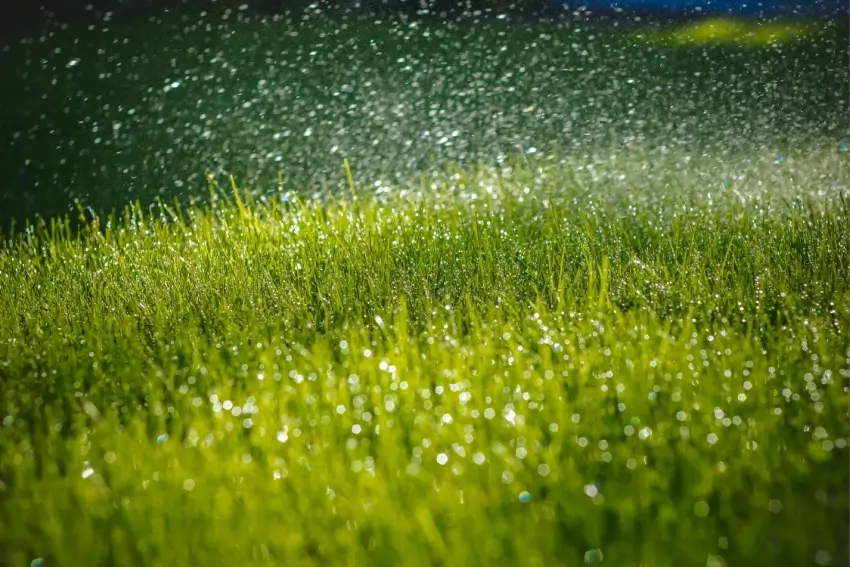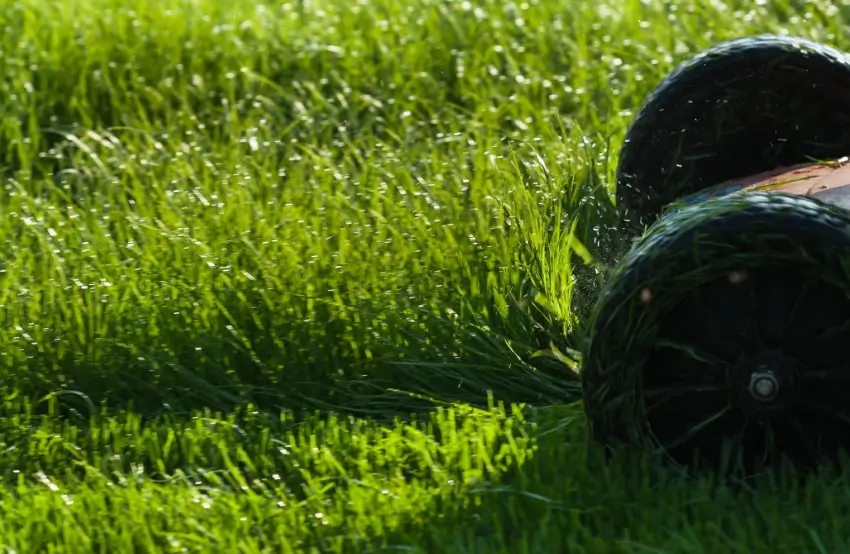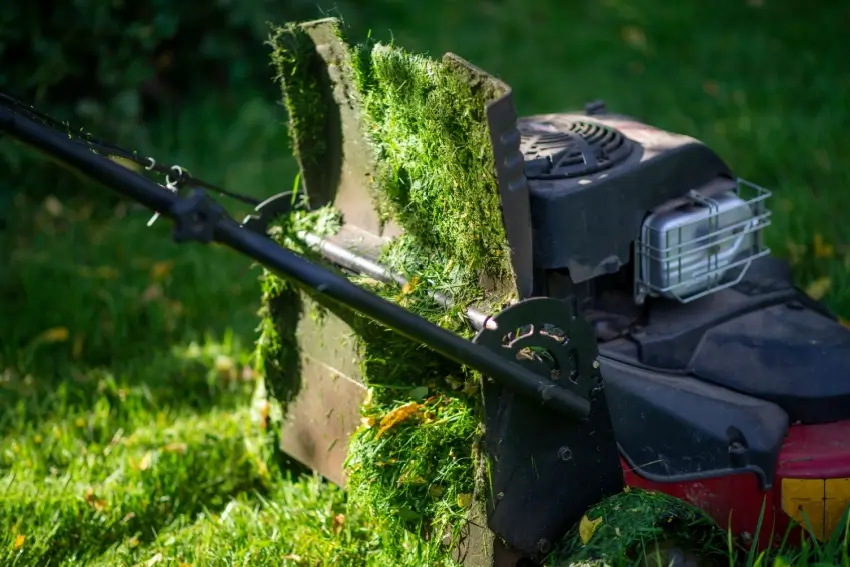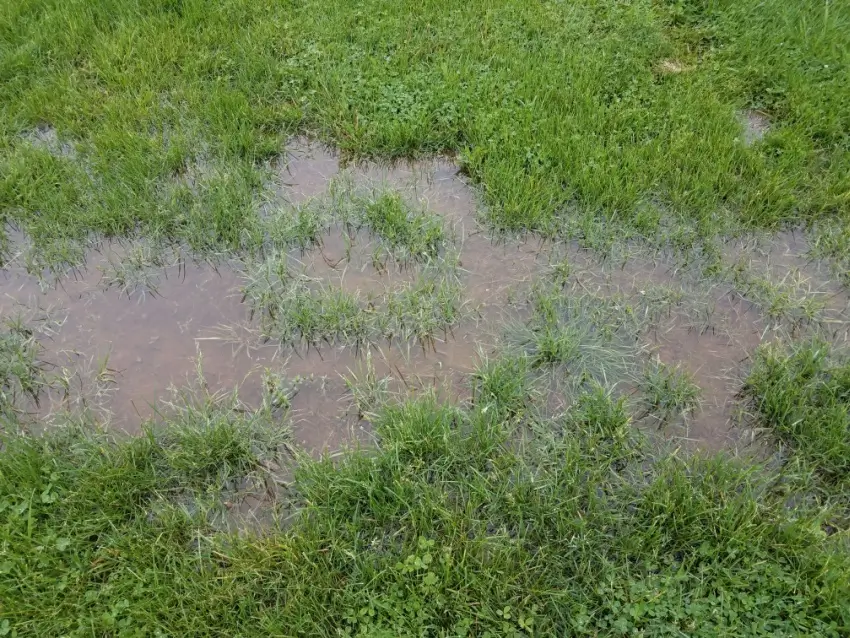Reasons Why You Should Not Cut Grass When It's Wet

It’s been raining…forever, and your grass keeps growing taller. You can practically hear your lawn begging to be cut from your windows. Perhaps you’d planned to mow over the weekend, and the rain is still coming down a little. So, what’s the harm in cutting wet grass?
The better question is, should you cut wet grass? We’ll answer those questions and explain why cutting wet grass can do more harm than good.
Table of Contents:
Can You Mow Wet Grass?
Cutting wet grass is dangerous for your health, your mower, and your lawn. It might not seem like that big a deal at the moment, especially if the rain isn’t coming down too hard, but even dewy, moist grass can cause issues for your lawn and put your safety at risk.
So, if you want to know, is it okay to mow wet grass? The answer is almost always no!
Why You Should Not Cut Grass When It’s Wet
Here are several reasons why you should keep your mower in the shed or garage and wait for the rain clouds to clear and your grass to dry before you attempt to mow it.
Damage to Your Lawn

Wet grass blades don’t stand up tall and make it easy for your mower blades to sweep through them. Instead, they bend under the weight of the water and clump together. This increases the chance that your mower blades will pull and tear the grass rather than cut it cleanly. The result can be a ragged, uneven lawn that looks worse than before you mowed it. Torn grass blades are also more susceptible to disease.
Mower Damage

Mowing a wet lawn slows down your mower blades and forces the engine to work harder. Wet clippings can quickly clog your mower deck and block the mower’s discharge shoot, causing clumps of wet grass to be deposited on your lawn. These clumps of wet grass will eventually smother your grass and leave dead patches in your lawn.
Finally, a wet lawn can make your mower extra difficult to clean after you finish and cause rust damage to your mower’s blades and other parts.
Soil Damage

If you have a push mower, the weight of the mower and your walking behind it can compress the wet soil, leading to soil compaction. Soil that is too compacted makes it difficult for your grass to absorb oxygen, nutrients, and water, which inhibits root growth and the overall health of your lawn.
Fungal Damage
.webp)
Fungus thrives in wet conditions, so your wet lawn is like a free candy shop for common lawn diseases like brown patch, anthracnose, and red thread. Cutting wet grass makes it easier for these fungus to spread across your lawn. It can also weaken your grass and make it more susceptible to fungal diseases, which can quickly take hold.
Damage to You
Is it safe to cut wet grass? No matter how much traction your shoes have, pushing a mower across wet, slick grass can lead to slips and falls. You want to avoid taking a tumble anywhere near a piece of equipment with spinning blades at the bottom. Mowing wet grass can be especially dangerous if your property includes slopes and hills. It’s not worth the risks. Wait until the grass dries, then fire up the mower or better yet, hire a pro to get the job done.
Is It Okay to Mow Wet Grass Occasionally?
If you can wait a few days for your lawn to dry out, you'll likely get a better result and protect your lawn, mower, and yourself. However, occasionally the weather doesn’t cooperate with such advice. If it’s been raining in your area for an extended period and your grass is growing excessively tall, you may need to cut wet grass despite the risks mentioned above.
If there are times when you absolutely have to mow wet grass, try to wait until the grass is as dry as possible. Here are some tips to follow if cutting wet grass is unavoidable.
Tips for Dealing with Wet Grass
If cutting wet grass is inevitable, we have a few suggestions for cutting wet grass that will help mitigate the risks to keep you as safe as possible.
Mow at a Higher Cutting Height
If you must mow wet grass, raise your mower’s cutting height. Taller grass handles the stress of wet mowing better. You’ll also be creating smaller clippings, which will be less likely to stick together in large clumps and smother certain areas of your lawn.
Sharpen Your Mower Blades
Mower blades typically struggle to slice through wet grass. Cutting wet grass with dull blades makes the job even more difficult. Sharp mower blades will cut cleanly and be less likely to tear the grass, which reduces the risks of damage to your lawn.
Take It Slow
Even if the weather isn’t pleasant, take your time mowing wet grass. A slower pace will reduce the amount of grass the mower takes in, giving it more time to process the heavier, wetter clippings. We recommend taking the half-cut approach. Instead of using a single pass approach that is the width of your mower, overlap your cutting pattern so you’re cutting half the width of your mower to ensure complete coverage and reduce the chances of clogging your mower. This involves making a second pass over grass you have already cut. Moving slowly will also minimize the risk of a fall.
Check and Clear the Mower Deck
Take frequent breaks, especially if you have a large lawn, and check your mower deck and discharge chutes for clumps and blockages. Always make sure your mower is off before checking the mower deck and clearing any blockages or accumulated clippings.
Avoid Mowing Slopes
No matter how much your grass is begging to be cut, a tidy lawn isn’t worth your safety. A fall on a slope with a mower can lead to serious injuries. Skip the slopes on your property and come back when the grass has dried completely. If your slopes are severe, you can also consider leveling your uneven lawn or hire a professional to do it.
Don’t Have Time to Mow? Hire the Pros
Whether conditions are wet or ideal, maintaining a healthy, thriving lawn takes considerable time and effort. If you desire a lush, green lawn but don’t have the time to invest, let the professional at The Grounds Guys® do all the work.
We offer a complete range of residential and commercial lawn care services to keep your lawn looking its absolute best, rain or shine. Get started by requesting a free quote today.
This article is intended for general guidance only and is not applicable to every situation. You are responsible for determining the proper course of action for your property and situation. The Grounds Guys are not responsible for any damages that occur as a result of advice and/or guidance derived from its blog content.
The Grounds Guys services may vary by location. Please contact The Grounds Guys franchise nearest you for more information.
 Click to call
Click to call


